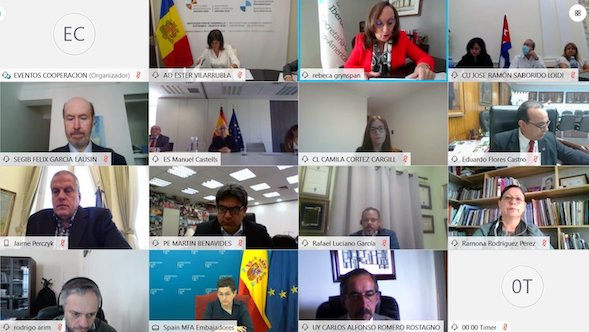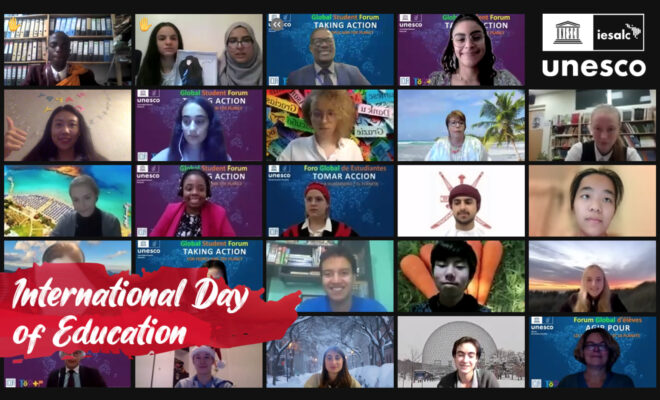The crossroads of higher education towards 2030

The accelerated growth in demand for access to higher education in recent decades, particularly in the Latin American and Caribbean region, is a clear sign of the economic and social value that this level of education represents, as pointed out in the recently launched UNESCO, UNICEF and ECLAC report ‘The crossroads of education in Latin America and the Caribbean. Regional monitoring report SDG4-Education 2030′.
Chapter 5: ‘Higher Education in SDG4-Education 2030‘, led by the UNESCO International Institute for Higher Education in Latin America and the Caribbean (IESALC), provides a high-level look at the main challenges, trends and public policy mechanisms managed by governments in the region since the beginning of the century.
One of the central goals of Sustainable Development Goal 4 (SDG 4) is the expansion of opportunities for access to higher education for the entire population. Along these lines, Latin American states have made significant efforts to democratize access through a wide range of policies.
On the supply side, countries such as Argentina, Brazil, Mexico and Uruguay have opted for the consolidation and creation of new public higher education institutions in order to meet the growing demand. In addition to expanding public offerings, some countries have promoted important measures of direct financing for students.
The gradual implementation of free higher education has been a key point in the latest reforms in Chile and Mexico, while countries such as Argentina, Ecuador, Uruguay and the Bolivarian Republic of Venezuela already have consolidated policies of universal free education. Chapter 5 of the report also addresses regional initiatives focused on promoting equitable access for minority populations and the most vulnerable segments. These policies include measures such as social and ethnic-racial quotas in Brazil’s federal universities and the creation of intercultural universities aimed at promoting access to forms and content specific to indigenous peoples.
One of the major trends in terms of structural reforms has been the adoption of policies focused on strengthening the State’s stewardship of national higher education systems. To achieve this objective, specialized political-administrative structures were created in the sector, which were accompanied by increases in public spending during certain periods.
At present, nine countries in the region (Argentina, Bolivia, Brazil, Chile, Colombia, Ecuador, Mexico, Paraguay and Uruguay) have implemented agencies within their ministries dedicated to managing their higher education systems, while others, such as Cuba and the Bolivarian Republic of Venezuela, opted for the creation of ministries with an exclusive mandate for higher education.
On the other hand, educational quality assurance, institutional accreditation and continuous improvement processes have become one of the priority areas of public policy in recent years. Almost all countries, with the exception of the Plurinational State of Bolivia and the Caribbean nations, have opted for a formula of collegial intervention and have implemented autonomous agencies focused on ensuring the provision of an educational service with quality standards. The exponential increase in demand that occurred at the beginning of this century led, in many cases, to an uncontrolled growth that could not be covered by public supply and, therefore, resulted in higher education systems open to commercialization.
It is precisely in this context that quality assurance policies played a fundamental role in purging under-qualified educational offerings, thus protecting the right of students to a quality education. In some cases, such as the Peruvian one, whose licensing process culminated in 2020, more than a third of the universities that used to operate received a license denial, thus reflecting the importance of putting quality on the public agenda.
Finally, the impact of the COVID-19 pandemic on higher education systems cannot be overlooked. While the distance education modality presented significant growth prior to the pandemic – it already had 4.3 million students in 2017 – the health crisis forced a rapid transition to virtuality to ensure continuity of educational service.
However, it is still uncertain to what extent the eventual windows of opportunity generated by COVID-19 will be exploited, since the most important determinant will bé knowing what public support institutions will have to undertake reforms that optimize the use of technology and develop the pedagogical skills of teachers in this modality.
UNESCO has promoted an international consensus that higher education should be seen as a public and social good. Despite the many challenges in this regard, the countries of Latin America and the Caribbean have implemented public policies that reflect progress in this direction. Chapter 5 of the report prepared by UNESCO, UNICEF and ECLAC reinforces the concept of higher education as a right and offers an overview of the main actions taken at the regional level.
By Mauricio Escribens, Junior Policy Analyst, UNESCO IESALC
RELATED ITEMS







